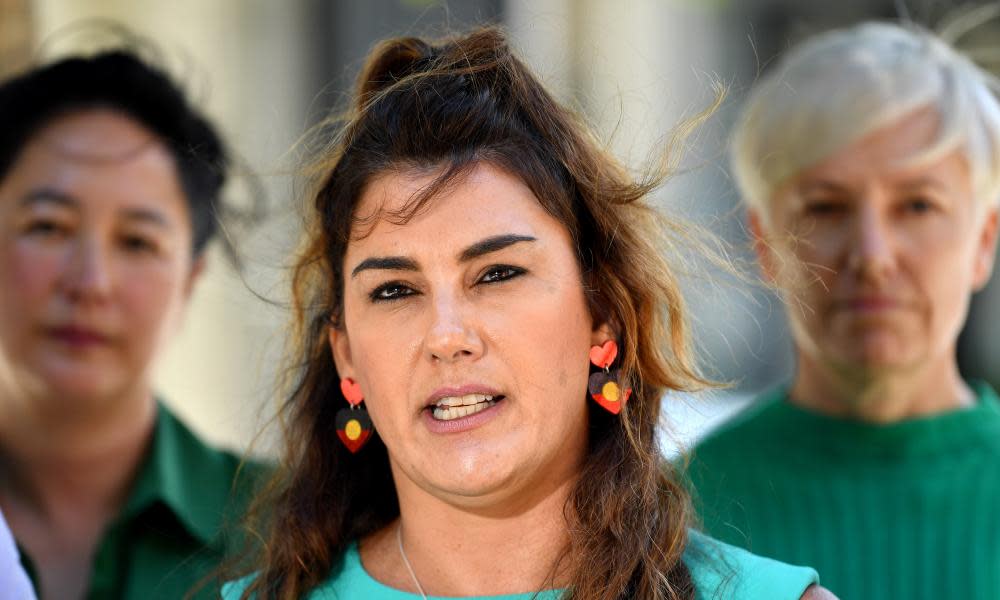Lidia Thorpe welcomes sovereignty assurances over voice but remains undecided

Greens senator Lidia Thorpe has welcomed a government assurance that the Indigenous voice to parliament will not cede First Nations sovereignty while also emphasising additional caveats on her position.
Senator Thorpe has been a vocal opponent of the voice and may break ranks with her federal party to oppose the body unless she is satisfied that it “guarantees First Nations sovereignty is not ceded”.
That argument was described as a “misnomer” by the assistant minister for Indigenous Australians, Malarndirri McCarthy, who told the ABC that “sovereignty will not be taken over or lost in this process” – a view shared by constitutional experts.
“I’m a Yanyuwa Garrwa woman from the Gulf of Carpentaria. We’ve never ceded [sovereignty]. Do you think I would stand by and let that happen? So, please, it is a misnomer”, McCarthy told QandA on Monday night.
Thorpe, who is the Green’s First Nations spokesperson, thanked McCarthy for that assurance but said she would prefer it be written in the constitution or in legislation.
When asked whether she could vote for the voice if her concerns about sovereignty were addressed, Thorpe said “it depends on home many lives we can save between now and then” and called for the recommendations of the Royal Commission into Aboriginal Deaths in Custody to be fully implemented.
“If all the states and territories can agree to a voice, then why can’t they agree to raise the age of legal responsibility so we can let our children out of these prisons?” Thorpe asked.
“I want to see action. Not words. I’m not saying which way I’m going until I see action.”
Almost half of all young people in detention in Australia are Aboriginal and Torres Strait Islander children, even though the overall number of children going to jail has fallen in the past five years, research shows.
The co-chair of the Indigenous voice co-design group, Tom Calma, said state and territory governments were primarily responsible for incarcerations rates, not the federal government.
Calma, who has previously said he felt “a bit offended” by Thorpe’s decision to telegraph opposition to the advisory body, cited a 2017 report by the Australian Law Reform Commission into incarceration rates, which called on states to overhaul bail laws.
On Monday, a Victorian coroner declared the state’s controversial bail laws discriminatory and a “complete, unmitigated disaster”, using landmark findings into the 2020 death in custody of First Nations woman Veronica Nelson to recommend urgent reforms.
McCarthy rejected claims the federal government had not sought to reduce Indigenous incarceration rates, citing the work of her senate colleague Pat Dodson, who sat on the deaths in custody commission.
“I’ve never worked with anyone who was more passionate of wanting to ensure that the incarceration rates in this country drop,” McCarthy said.
“There is no doubt that every state and territory jurisdiction has responsibility for the jails and for the custodial sentences and that many that need to improve their game. There is no doubt about that.”
Some Greens members, such as senator Sarah Hanson-Young, have strongly backed the voice and say they will support the referendum. It opens the possibility that the Greens will be split on the final vote.
“I want to see progress and I don’t want this held up just because we can’t get to a good place of working together,” Hanson-Young told the ABC earlier on Monday.
“It would be devastating if we didn’t get progress on all three (elements of the Uluru Statement of the Heart).”
The Greens are still in negotiations with the Labor government over the voice, but expect to come to a final party room decision in early February.

 Yahoo Movies
Yahoo Movies 
